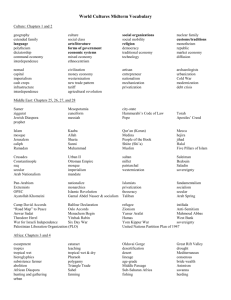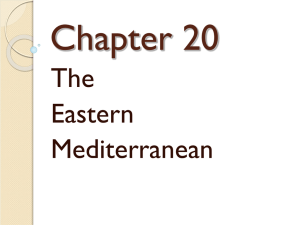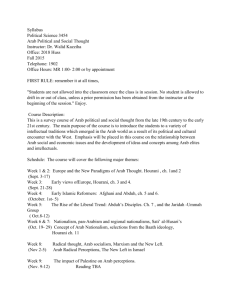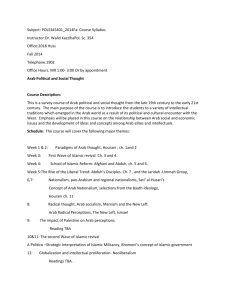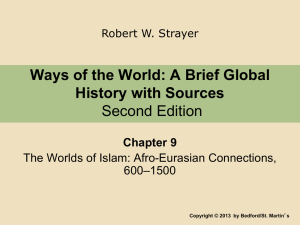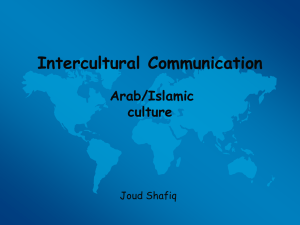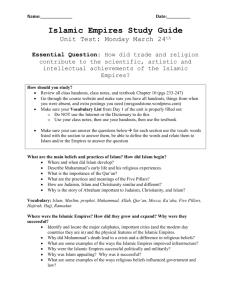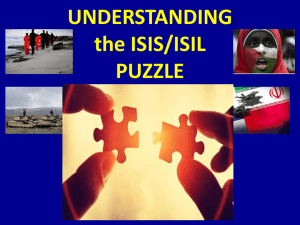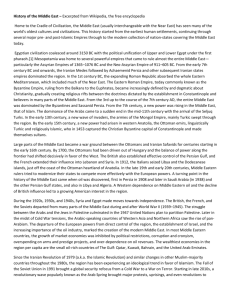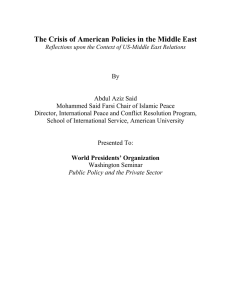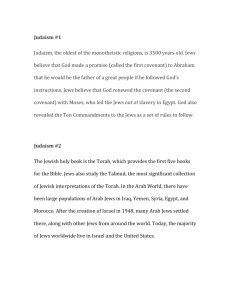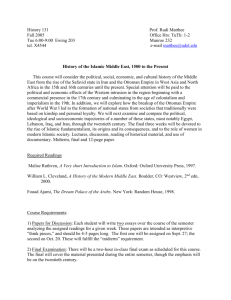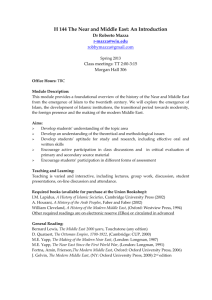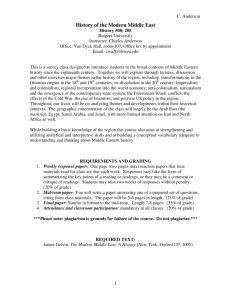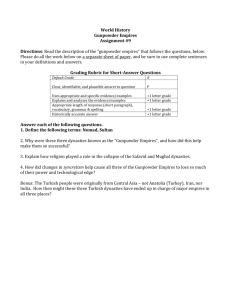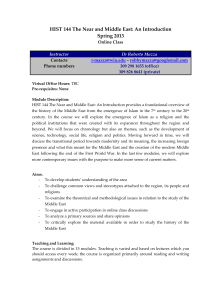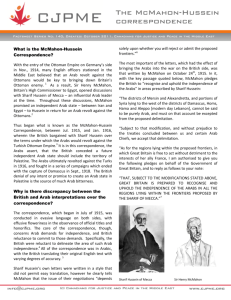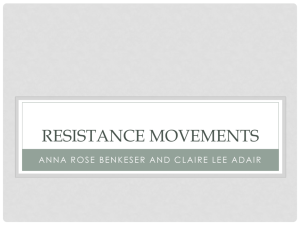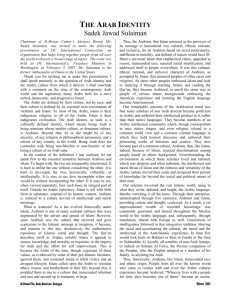hist130course - Winona State University
advertisement
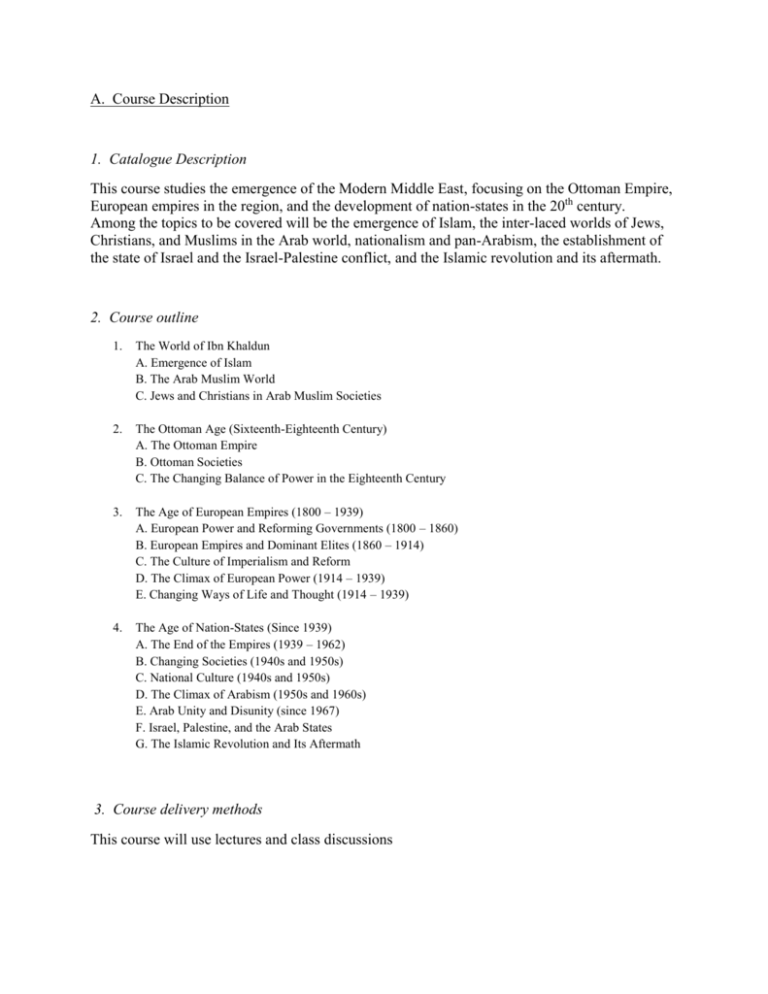
A. Course Description 1. Catalogue Description This course studies the emergence of the Modern Middle East, focusing on the Ottoman Empire, European empires in the region, and the development of nation-states in the 20th century. Among the topics to be covered will be the emergence of Islam, the inter-laced worlds of Jews, Christians, and Muslims in the Arab world, nationalism and pan-Arabism, the establishment of the state of Israel and the Israel-Palestine conflict, and the Islamic revolution and its aftermath. 2. Course outline 1. The World of Ibn Khaldun A. Emergence of Islam B. The Arab Muslim World C. Jews and Christians in Arab Muslim Societies 2. The Ottoman Age (Sixteenth-Eighteenth Century) A. The Ottoman Empire B. Ottoman Societies C. The Changing Balance of Power in the Eighteenth Century 3. The Age of European Empires (1800 – 1939) A. European Power and Reforming Governments (1800 – 1860) B. European Empires and Dominant Elites (1860 – 1914) C. The Culture of Imperialism and Reform D. The Climax of European Power (1914 – 1939) E. Changing Ways of Life and Thought (1914 – 1939) 4. The Age of Nation-States (Since 1939) A. The End of the Empires (1939 – 1962) B. Changing Societies (1940s and 1950s) C. National Culture (1940s and 1950s) D. The Climax of Arabism (1950s and 1960s) E. Arab Unity and Disunity (since 1967) F. Israel, Palestine, and the Arab States G. The Islamic Revolution and Its Aftermath 3. Course delivery methods This course will use lectures and class discussions 4. Course requirements Students will be required to complete course readings for the assigned date, and to bring to class their questions on the readings. Students will be expected to take an active part in class discussions. There will be periodic quizzes on the readings, and take-home midterm and final exams. Students will select one newspaper available in English from one of the countries of the Middle East and read it throughout the semester; there will be periodic short paper assignments to complete based on these newspapers. 5. Course materials Thomas Friedman, Longitudes and Attitudes: Exploring the World after September 11 (New York, 2002) Bernard Lewis, The Shaping of the Modern Middle East (New York, 1994) Albert Hourani, Philip Khoury, and Mary Wilson, eds., The Modern Middle East: A Reader (London, 2004) Rula Jebreal, Miral (New York, 2010) Amos Oz, A Tale of Love and Darkness (NY: Harcourt, 2004). 6. Assessment of Outcomes This course will fulfill the following History Department learning outcomes: Skills *To develop students’ ability to express their ideas clearly in written form *To develop students’ ability to express their ideas in oral presentations *To enhance students’ capacity for independent, critical thought To develop in students the understanding that history is actually an on-going interpretive debate and not a series of short answers Knowledge *To develop students’ understanding of both long-term trends and discrete events in the history of the United States, Europe, and at least two other cultural groups *To develop students’ ability to consider the past in terms of both change and continuity * To develop students’ understanding of the ways in which change affects different groups in different ways Values *To enhance students’ tolerance of diverse peoples and cultures *To enhance students’ ability to act as responsible citizens who make informed, reasoned judgments *To promote among students a collaborative work and learning ethic These outcomes will be assessed through completion of course requirements, as well as through midterm and end-of-term evaluations. 7. List of references Ervand Abrahamian, A History of Modern Iran (New York, 2008) Lila Abu-Lughod, Writing Women’s Worlds: Bedouin Stories (Berkeley, 1993) Karen Armstrong, Jerusalem: One City, Three Faiths (New York, 2005) ---- Islam: A Short History (New York, 2002) Samih Farsoun, Palestine and The Palestinians: A Social and Political History (Boulder, CO, 2006) Albert Hourani, A History of The Arab Peoples (Cambridge, MA, 1991) Albert Hourani, Europe and The Middle East ( Berkeley, 1980) Rashid Khalidi, The War for Palestine: Rewriting The History of 1948 (NY, 2001) Tarif Khalidi, Islamic Historiography: The Histories of Mas’udi (Albany, NY, 1975) Walter Laqueur, A History of Zionism (New York, 1976) Howard M. Sachar, The Course of Modern Jewish History (New York, 1990) Bernard Lewis, The Jews of Islam (London, 1984) Kevin McKiernan, the Kurds: A People in Search of Their Homeland (New York, 2006) Edward Said, Orientalism (New York, 1994 Spencer Tucker, ed., The Encyclopedia of the Arab-Israeli Conflict (Santa Barbara, 2008) Lawrence Wright, The Looming Tower: Al-Qaeda and The Road to 9/11 (New York 2007) B. Rationale 1. Major Focus and Objectives This course will focus on long-term historical developments in the Middle East in the 19th and 20th centuries, and on more recent developments in the region since the end of European Empires. This will prepare students to begin understanding developments in the Middle East in the 21st century that we will cover at the end of the course. This course has three central objectives: first, to expand geographically and culturally the scope of the History course offerings; second, to contribute to the University Studies/General Education Program an additional opportunity for students to learn about a part of the world that is of great importance for the modern world; third, to provide students with an understanding of the historical background of current developments in the middle East, so that they may become more knowledgeable readers, more critical consumers of news media, and more informed, analytical citizens of the global community. 2. Contributions to Department Curriculum The History Department does not currently offer any courses that focus exclusively on the Middle East. This course will begin to fill this significant gap in our curriculum. 3. Impact on Course Offerings There will be no courses dropped if this course is approved. This course will be rotated in with other courses offering global perspectives on the past. C. Impact on Other Departments, Programs, Majors, or Minors This course will not increase or decrease the total credits required by a major or minor in any other department
